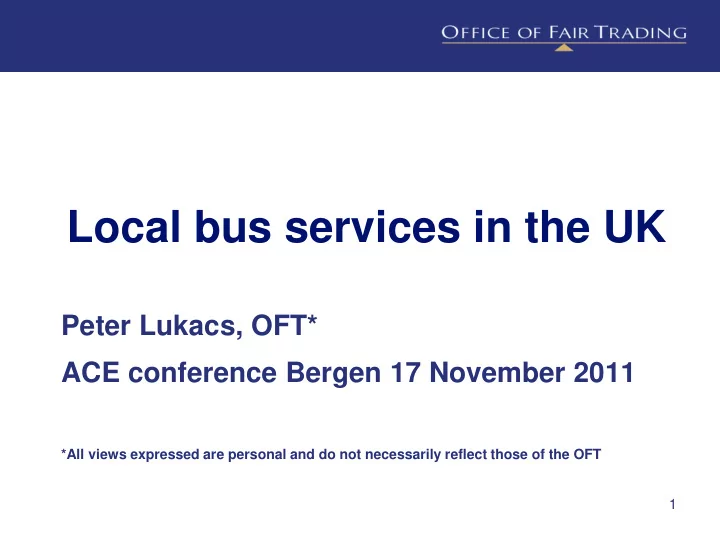

Local bus services in the UK Peter Lukacs, OFT* ACE conference Bergen 17 November 2011 *All views expressed are personal and do not necessarily reflect those of the OFT 1
The UK Bus regime ● Deregulation of local bus services in 1986 (excluding London and Northern Ireland) ● Bus operators free to operate commercial services at 56 days notice for new services and variations to timetables ● Tendered services subsidised by local transport authorities ● In London route by route franchising system – no ‘on the road’ competition 2
Industry structure ● About 70% of supply of commercial services provided by four large national groups - Stagecoach, Arriva, First, Go-Ahead - A large proportion of the remainder provided by a small number of regional groups or municipally owned companies - About 1250 operators in total - Substantial consolidation through merger post deregulation through the 1990’s and continues now. 3
A contestable market? ● One idea behind bus deregulation was that local bus services met the criteria for contestability (no sunk costs, no barriers to entry or exit and equal access to technology) ● Empirical implication is that current level of concentration may not matter for performance due to the constraint of potential competition ● OFT Price concentration analysis found price reductions where more competitors in local areas ● CC Performance concentration analysis found effect on service frequency from additional competitor (but mixed evidence of a price effect) “an absence of persuasive evidence that the threat of new entry, and in many cases the threat of potential competition, act as a constraint on market outcomes” CC Provisional Findings 11.17
The OFT’s view on MIR Very little on-road competition Barriers to Entry: Market Feature: Little evidence of Reputation Tendency towards local entry by ‘the big 5’ Network Effects ‘monopoly’ of except through Depot Access acquisition commercial services Higher prices to Potential for further harm if Consumers* commercial ‘monopoly’ Possibly lower Quality affects tendered services 5 *Based on OFT’s price concentration analysis
CC’s provisional findings Adverse Effect on Competition (AEC) caused by three features ● High levels of concentration at a route level and within wider local areas ● Barriers to entry - Sunk costs, intense post entry competition, incumbency advantages (network and ticketing), depot availability, bus station access, cheap exclusion (e.g. obstruction of a rival’s services, preventing them from using bus stops and stands, intimidating drivers, vandalism of vehicles, and removing rival operators’ publicity and timetables) ● Customer conduct
Effective competition? ● ‘On the road’ competition typically does not mean that consumers have a choice of operator since most routes are served by only one operator. ● Route level competition often short lived with many allegations of predatory conduct and other forms of ‘cheap exclusion’ ● head-to-head competition tends towards instability “The competitive process does not necessarily lead to the most efficient operator running the route and the surviving operator is not necessarily exposed to an ongoing discipline following the exit of its rival” CC provisional findings report, Summary paragraph 4 7
Geographic market segregation ● CC’s initial provisional finding was that the conditions for tacit coordination were met but no AEC found ● Further findings of AEC in North East England based upon contacts between two bus companies ● Evidence of retaliation and signalling elsewhere in the country ● Notion of companies having ‘territories’ that they defend
Tendered Services ● Tendered services often fill the gaps around commercial services, services such as thin routes or covering evenings and weekends ● Weaknesses in competition for tendered services may in part be driven by LTA tender design ● Only London has a fully franchised system, London is special case. Much larger than any other city in the UK. ● Passenger number had been steadily falling outside London. Reversed recently partly due to changes in concessionary travel. London bus use has been steadily expanding since mid 1990’s
Franchising CC’s conclusion on franchising ● “franchising [is], in principle, a practicable alternative to competition ‘in the market’, and could be made to operate successfully.” CC Provisional Decision on Remedies Para 408 ● However disadvantages from reduced responsiveness to consumer demand and potential distortion with inter-urban services ● Additional costs from LTA costs of award and monitoring, operator bid costs, risk transfer from private to public sector weighed against lower costs from improved network design ● “Our preference, in relation to local bus services, is for remedies that provide the basis for effective and sustained competition ‘in the market’ compared with those that promote competition ‘for the market’.” CC Provisional decision on Remedies Para 421
Peter Lukacs, OFT ACE conference Bergen 17 November 2011 11
Recommend
More recommend